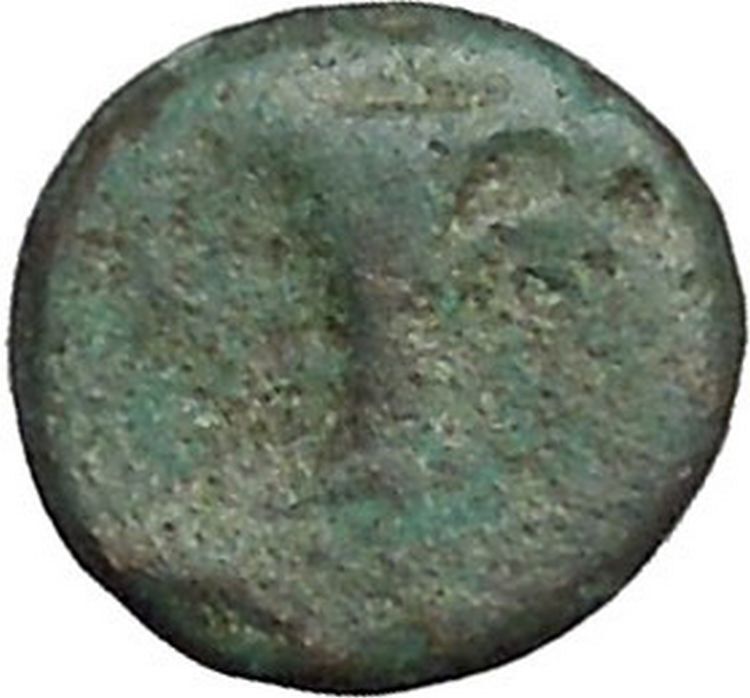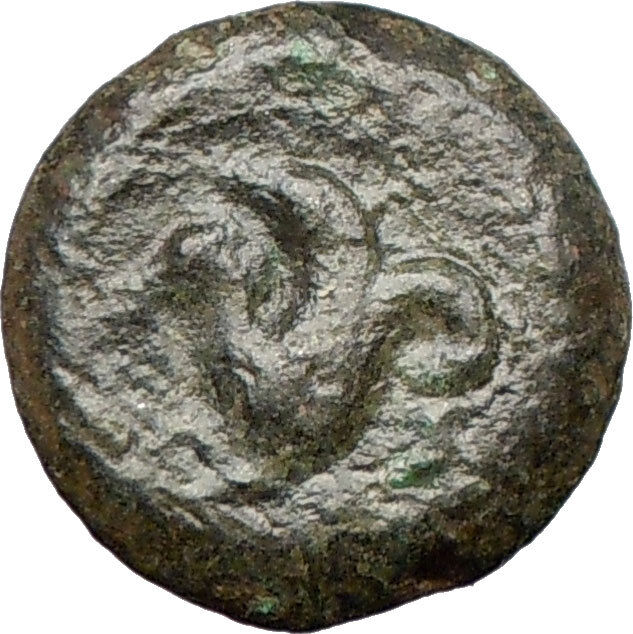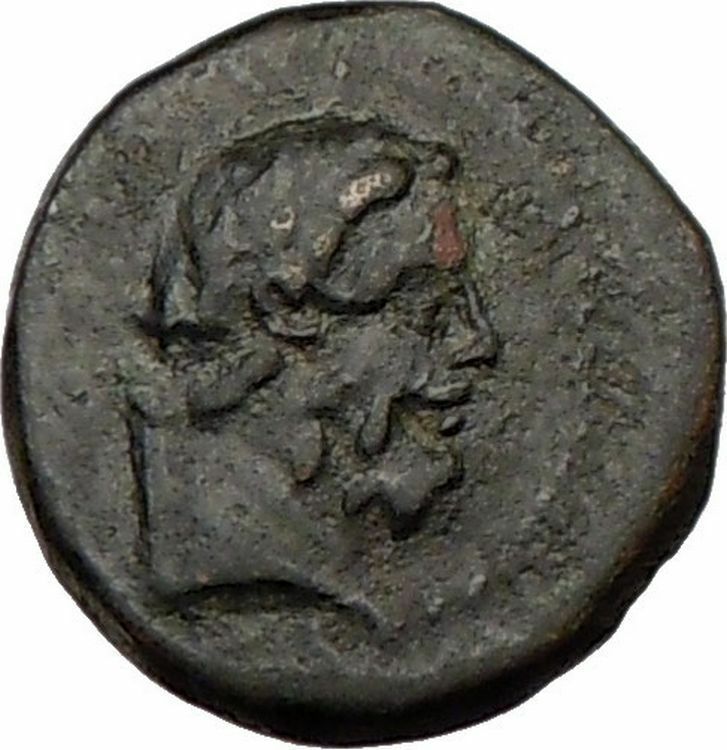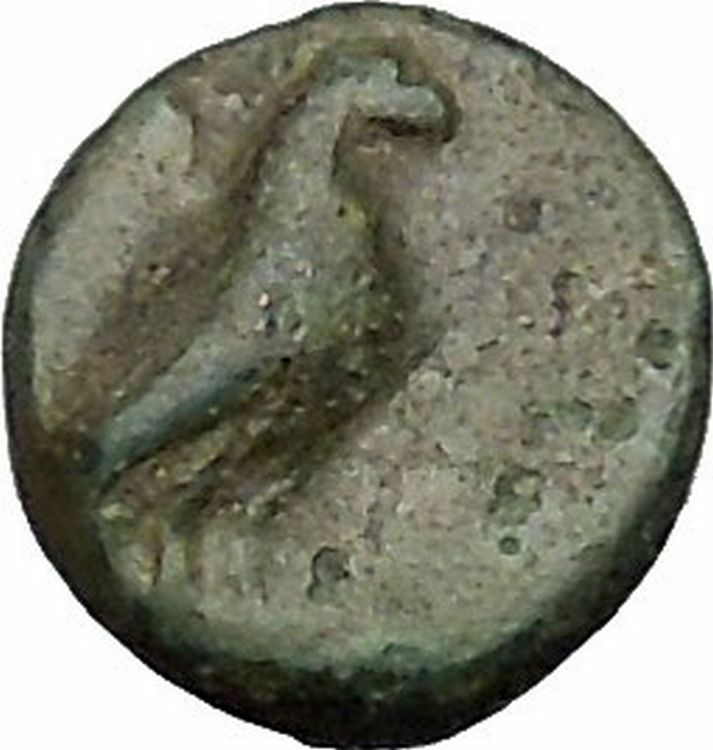|
Greek coin of
Seleukid Kingdom
Alexander I Balas – King: 152-145 B.C.
Bronze 19mm (6.30 grams) Struck 150-145 B.C.
Reference: Sear 7040
His head right, in crested helmet.
ΒΑΣΙΛΕΩΣ ΑΛΕΞΑΝΔΡΟΥ, either side of Nike standing left, crowning the king’s name
and
holding palm; in field to left, corn-ear and monogram.
Claiming to be a son of Antiochus
IV, Alexander Balas swept to power in Syria in 150 B.C. with the support of
Attalos of Pergamon and Ptolemy of Egypt. However, his dissolute life-style soon
made him unpopular, and he was overthrown after a reign of only five years.
You are bidding on the exact item pictured,
provided with a Certificate of Authenticity and Lifetime Guarantee of
Authenticity.

In
Greek mythology
,
Nike
was a
goddess
who personified
victory
, also known as the Winged Goddess of
Victory. The Roman equivalent was
Victoria
. Depending upon the time of various
myths, she was described as the daughter of
Pallas
(Titan) and
Styx (Water) and the sister of
Kratos
(Strength),
Bia
(Force), and
Zelus
(Zeal). Nike and her siblings were close
companions of Zeus
, the dominant deity of the
Greek pantheon
. According to classical (later)
myth, Styx brought them to Zeus when the god was assembling allies for the
Titan War
against the older deities. Nike
assumed the role of the divine
charioteer
, a role in which she often is
portrayed in Classical Greek art. Nike flew around battlefields rewarding the
victors with glory and fame.
Nike is seen with wings in most statues and paintings. Most other winged
deities in the Greek pantheon had shed their wings by Classical times. Nike is
the goddess of strength, speed, and victory. Nike was a very close acquaintance
of Athena
, and is thought to have stood in
Athena’s outstretched hand in the statue of Athena located in the Parthenon.
Nike is one of the most commonly portrayed figures on Greek coins.
Names stemming from Nike include amongst others:
Nicholas
, Nicola, Nick, Nikolai, Nils, Klaas,
Nicole, Ike, Niki, Nikita, Nika, Niketas, and Nico.
Alexander Balas (Greek
Ἀλέξανδρoς Bάλας), ruler of the
Greek
Seleucid kingdom
150-146 BC, was a native of
Smyrna
of humble origin, but gave himself out
to be the son of
Antiochus IV Epiphanes
and heir to the Seleucid
throne. Along with his sister Laodice, the youngster Alexander was “discovered”
by Heracleides, a former minister of Antiochus IV and brother of
Timarchus
, an usurper in
Media
who had been executed by the reigning
king
Demetrius I Soter
.
Alexander’s claims were recognized by the
Roman Senate
,
Ptolemy Philometor of Egypt
and others. He
married
Cleopatra Thea
, a daughter of the
Ptolemaic dynasty
. At first unsuccessful,
Alexander finally defeated Demetrius Soter in 150 BC. Being now master of the
empire, he is said to have abandoned himself to a life of debauchery. Whatever
the truth behind this, the young king was forced to depend heavily on his
Ptolemaic support and even struck portraits with the characteristic features of
king
Ptolemy I
.
Demetrius Soter’s son
Demetrius II
profited by the opportunity to
regain the throne. Ptolemy Philometor, who was Alexander’s father-in-law, went
over to his side, and Alexander was defeated in the
battle of Antioch (145 BC)
in Syria, sometimes
known as the battle of the Oenoparus.
He fled for refuge to a
Nabataean
prince, who murdered him and sent his
head to Ptolemy Philometor, who had been mortally wounded in the engagement.
Seleucid
Empire
Σελεύκεια
Seleúkeia |

|
312 BC–63 BC |
↓
|
|
|
The Seleucid Empire in 301 BC.
|
The Seleucid Empire
was a
Hellenistic
state ruled by the Seleucid dynasty
founded by
Seleucus I Nicator
following the division of
the empire created by
Alexander the Great
. Seleucus received
Babylonia
and, from there, expanded his
dominions to include much of Alexander’s
near eastern
territories. At the height of its
power, it included central
Anatolia
, the
Levant
,
Mesopotamia
,
Kuwait
,
Persia
,
Afghanistan
,
Turkmenistan
, and northwest parts of
India
.
The Seleucid Empire was a major center of
Hellenistic
culture that maintained the
preeminence of
Greek
customs where a Greek-Macedonian
political elite dominated, mostly in the urban areas. The Greek population of
the cities who formed the dominant elite were reinforced by emigration from
Greece
. Seleucid expansion into
Anatolia
and Greece was abruptly halted after
decisive defeats
at the hands of the
Roman army
. Their attempts to defeat their old
enemy
Ptolemaic Egypt
were frustrated by Roman
demands. Much of the eastern part of the empire was conquered by the
Parthians
under
Mithridates I of Parthia
in the mid-2nd century
BC, yet the Seleucid kings continued to rule a
rump state
from
the Seleukid Kingdom
until the invasion by
Armenian
king
Tigranes the Great
and their ultimate overthrow
by the Roman
general
Pompey
.
|










